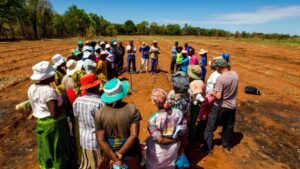Categories
-
ANU Africa Network
Posted on
by
This website was established in 2013 by David Lucas, and renovated and relaunched in 2020 as part of a project to increase awareness of Africa and African studies in the ANU and the ACT, funded by the Australian Government’s Department of Foreign Affairs and Trade.
Another outcome of that project was a major research report, published in August 2021, African Studies at the Australian National University and in the Australian Capital Territory, analyzing the past, present and future of the study of Africa at the Australian National University and the wider Australian University sector.

The major innovation on this updated website is the creation of the ACT Africa Expert Directory which lists experts on Africa from institutions around the ACT, primarily the ANU. We will continue to curate this list, offering a key resource for media, government and non-government organizations seeking expert facts and opinions on Africa. Individuals can request to be added to the list by contacting the website managers.
Another notable addition is the expanded directory of PhD theses on Africa produced in the territory’s universities, a solid measure of the vitality of the study of Africa in the city of Canberra.
Reviewing these directories, it is revealing to note that the vast majority of research on Africa is produced by disciplinary experts (environmental scientists, economists, demographers, etc.) rather than area studies experts. This means that the study of Africa is woven into the fabric of the research culture of the ANU and the ACT’s other universities in ways that are not necessarily apparent.
-
TRANSFORMING SMALL SCALE IRRIGATION IN SUB-SAHARAN AFRICA
Posted on
by
Professor Jamie Pittock of the Fenner School has advised that:
‘Here is the formal agenda plus registration for in person and by zoom: ANU seminar Thursday 13th October, 2-5 pm – Transforming irrigation in southern Africa.’
https://fennerschool.anu.edu.au/news-events/events/transforming-small-scale-irrigation-sub-saharan-africa
-
Decolonial Gazing and Hermeneutic Resistance: Black German Challenges to White German Cultural Hegemony in the Museum
Posted on
by
Tomorrow, Thurs 6/10 @4:30pm AEDT (with apologies for late posting)
This work in progress essay highlights the ways that Black Europeans, in this case in the German context, challenge universalizing notions of cultural heritage to highlight decolonial possibilities and interrogate the collection, display, and spectatorship of museum objects in majority-white contexts. I use the Berlin Ethnological museum in its former and current iterations as a representative example of debates about collecting and looking at museums, showing how thinkers like Fatima El-Tayeb and Kum’a Ndumbe III and initiatives like No Humboldt21! offer challenges to universalizing discourses and reflect the gaze back on whiteness. Finally, I offer a reading of a literary challenge to this universalism in Sharon Dodua Otoo’s 2021 novel Adas Raum (Ada’s Realm).
Maureen Gallagher is a lecturer in German Studies at ANU. She holds a PhD in German Studies from the University of Massachusetts Amherst and is currently working on a book manuscript on whiteness in Wilhelmine German youth literature and culture based on her dissertation. Her research and teaching interests include race and gender in German colonial literature, Black German Studies, connections between German Studies and Indigenous Studies, and inclusive, anti-racist and decolonial teaching practices.
-
Transforming Small-Scale Irrigation in sub-Saharan Africa
Posted on
by
Thursday, 13 October 2022, 2–5pm
Small-scale irrigation schemes have been identified as a major vehicle to improve the livelihood of smallholder farmers and their communities in sub-Saharan Africa (SSA), including improving food security, education, health and adapting to climate change.
 The Australian Centre for International Agricultural Research (ACIAR) funded the project Transforming Small-scale Irrigation in Southern Africa (TISA) from 2013. The proposal was to use innovative institutions and technologies to address the complex set of challenges and barriers inhibiting the profitability of this sector, and its ability to initiate the process of transforming small scale irrigation schemes from underperforming to sustainable and profitable systems.
The Australian Centre for International Agricultural Research (ACIAR) funded the project Transforming Small-scale Irrigation in Southern Africa (TISA) from 2013. The proposal was to use innovative institutions and technologies to address the complex set of challenges and barriers inhibiting the profitability of this sector, and its ability to initiate the process of transforming small scale irrigation schemes from underperforming to sustainable and profitable systems.This session will report on the outcomes of the first nine years of TISA, which has had a remarkable impact on the livelihoods of smallholder farming families. We also outline our vision for how this success should inform a future program to develop circular food systems to accelerate sustainable rural development.
Speakers
- Prof Jamie Pittock, ANU
- Dr Mario Chilundo, Eduardo Mondale University
- Dr Luitfred Kissoly, Ardhi University
- Thabani Dube. International Crops Research Institute for the Semi-Arid Tropics, Bulawayo, Zimbabwe
- Dr Richard Stirzaker, CSIRO
- PhD Candidate Karen Parry, UniSA
- PhD Candidate Michael Wellington, ANU
- Dr Njongenhle MB Nyoni, The Food, Agriculture and Natural Resources Policy Analysis Network, Pretoria, South Africa
- Dr Ana Manero, ANU
- Dr Neil Lazarow, Australian Centre for International Agricultural Research
Location
Frank Fenner Seminar Room, Building 141 Linnaeus Way, Acton ACT 2601
Also online via Zoom
